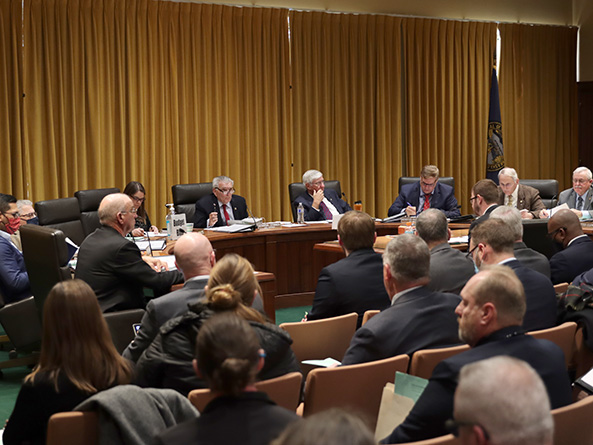Proposal for allocating federal pandemic relief funds considered
The Appropriations Committee heard testimony Jan. 25 on the governor’s recommendations to appropriate federal American Rescue Plan Act funds.
LB1014, introduced by Speaker Mike Hilgers at the request of Gov. Pete Ricketts, contains recommended appropriations for fiscal year 2021-22 and FY2022-23 for the $1.04 billion in ARPA funds that Nebraska has been allocated to mitigate the impact of the coronavirus pandemic.
The state has received $520 million and an additional $520 million is anticipated by May 2022. Federal law specifies that expenditures must either support COVID-19 mitigation efforts, respond to negative economic impacts, replace lost revenue, provide premium pay for essential workers or fund water, sewer and broadband infrastructure projects.
Among the appropriations outlined in LB1014 are:
• $47.7 million to the state Law Enforcement Training Center;
• $50 million for Statewide Tourism and Recreational Water Access and Resource Sustainability Fund projects;
• $60 million for family-directed education recovery accounts for low-income children and families;
• $60 million for statewide drinking water projects;
• $100 million for the Perkins County canal project; and
• $100 million for shovel-ready capital projects.
Tom Riley, director of the state Department of Natural Resources, testified in support of the Perkins County canal project allocation, which he said is “essential” to preserving water access in the state. He said Colorado currently is spending 20 times that amount to develop projects that would restrict the flow of water from the South Platte River into Nebraska.
“Nebraska needs to build this project so we can fully enforce our rights under the South Platte River Compact,” Riley said. “If we don’t start now, we miss the opportunity.”
Jim Macy, director of the Nebraska Department of Environment and Energy, also supported the proposal. He said the funding would improve fish and wildlife habitats and provide more water for the Platte River system at the most critical times of the year.
Testifying in opposition on behalf of the Sierra Club of Nebraska, Al Davis said the proposed canal project likely would result in decades of lawsuits from Colorado before work could even begin on canal construction or on permitting proposals for a reservoir. Calling the idea “questionable” and “risky,” Davis said ARPA funds instead should be used to enhance the state’s existing water infrastructure and other priorities.
Testifying in support of an allocation of $47.7 million for the Law Enforcement Training Center, Don Arp said the funding would be “nothing short of transformative.” Arp, executive director of the Nebraska Crime Commission, said violent crimes — including homicides — have increased significantly during the pandemic. At the same time, he said, Nebraska is at least 100 officers short of capacity at all levels of law enforcement when the state needs them most.
Arp said the governor’s proposal would fund the purchase of approximately 100 acres of land in the Grand Island area to expand dormitory space, construct an indoor firearms range and build a video production studio, among other projects.
No one testified in opposition to the proposal.
Several testifiers spoke in favor of a proposed $100 million expansion in funding for a mechanism that was passed by lawmakers in 2021 meant to jump-start certain construction projects delayed by the COVID-19 pandemic. That bill provided $15 million in matching grants to qualifying sports complexes and nonprofits related to arts, culture or the humanities and allowed for allocation of additional federal funds.
Proponents of projects ranging from sports complexes to nonprofit hubs and restoration efforts encouraged committee members to support the provision.
Jeff Weak of Omaha said the state Department of Economic Development received 125 applications for projects totaling approximately $325 million before the grant period ended July 15, 2021.
“[This] is really about hope for the future and investment in not-for-profits in our state,” Weak said.
A provision to fund $60 million in family-directed education recovery accounts as a pilot project also was discussed. Funds of up to $2,000 per child, per school year would be available to students who qualify for the federal free lunch program and could be used for private school tuition, tutoring, digital-learning subscriptions and other K-12 educational services.
Jeremy Ekeler of the Nebraska Catholic Conference testified in support of the proposal. Studies have shown that students were five months behind in mathematics and four months behind in reading at the end of the 2021 school year due to pandemic disruptions, he said.
Low-income and minority families are least able to pursue alternative and supplemental assistance to make up for these learning losses, Ekeler said, noting that funds for the pilot program would be available to public, private and home-schooled students.
“Ultimately, the families disproportionally impacted by the pandemic experienced increased educational costs at a time when financial circumstances were already constrained,” he said.
Tim Royers, speaking on behalf of the Nebraska State Education Association, testified in opposition. Discounts on private school tuition would not meet the additional social, emotional and mental health needs generated by the pandemic, he said. Funds would be better spent on fully funding speech and language pathologists and school psychologists who serve all the state’s public and private school students, he said.
“Now is the time to make sure our resources are going to proven solutions, expanding established infrastructure to make sure that we’re truly meeting the needs of all Nebraskans,” Royers said.
The committee took no immediate action on LB1014.


